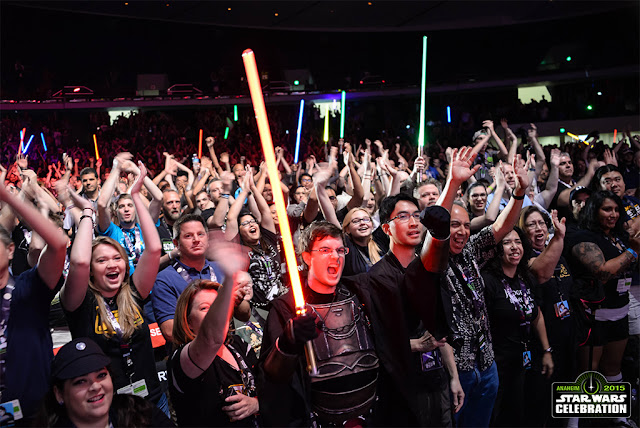Against Fandom
 |
| Blue shirt guy, how did you find yourself here? |
Mass culture today is the logical endpoint of the youth culture created by marketing in the 1950's. Prior to this era, childhood was a time for parents to instruct their children in right behavior and responsibility, so that they would enter their majority well suited to adulthood. The fantastical stories of imagination and the youthful play of early adolescence was age-appropriate acculturation that gradually gave way to deeper intellectual and emotional understanding of the real world and their place in it. But post World War II, with the advent of universal mass media, clever capitalists realized there was a huge, untapped source of revenue from children, and especially those individuals previously known as "young adults." Rising standards of living gave this cohort new spending power, either directly or via their parents, and by George if someone shouldn't try to sell something to them. But how?
Flattery, and an appeal to the comforts of childhood. On the one hand, this new marketing made the case that the new class of consumers now known as "teenagers" was smarter, more "modern" than their parents; while at the same time, selling a prolonged adolescence to the young people who were straddling the line between child and adult. Because clothing, music records and Coca-Cola were cheap to make and consumable in large quantities, the message that a teenager should be primarily concerned with these things and not the gradual realization of their mature faculties became the engine for vast profits. The best way to keep this gravy train rolling was to keep people teenagers as long as possible, and youth culture became mass culture.
And so here are: voting age Americans, having garbed themselves in the correct branded apparel and plastic costumes and holding toy light sabers, now scream and chant as a giant MegaCorp puts on an advertisement for yet another movie for children. Children, you say? But the only people in this picture are adults!
It's not wrong to enjoy a movie, you say. I agree, and I enjoy many movies, some incredibly stupid- The Fast and the Furious movies, for example, are a particular guilty pleasure of mine. But I would never put on a plastic mask of Vin Diesel's face, and spend a hundred bucks to go to some auditorium where the movie studio executives would come out, so I could scream, "Ride or die!" at them in unison with all the other "furiousers" as in a ritual chant, before going home and telling my wife what a magical experience it was to see Tyrese Gibson up on stage. Because I'm a grown man, and such behavior is beneath me.
In the past, princes would outlaw, ban and prosecute anyone who led mass movements like this in public; it was viewed as a threat to law and order, to the very fabric of society itself. Miracle healers, sybaritic philosophers, transcendental gurus and travelling theater groups were put down regularly, if it seemed like people were ignoring their livelihoods, their fealty to the prince, or their duties to the Church as a result. We know now that they had good reason for this censure, with the psychology of mass psychosis well-understood. But the premoderns didn't need anything other than experience to know the dangers of crowds wrapped up in a psychodrama of collective hysteria.
My kids enjoy the Marvel movies, and I've seen, oh, about 50 of them. I just can't watch another one. I can't watch another Star Wars movie. I have completely used up my tolerance for nerd shit, which means an increasingly large part of the Internet is basically worthless to me. I am less and less happy about allowing my kids to spend time with this material. The fact is that, at bottom, these are mostly trite, disposable movies and TV shows, with little to say about the human condition and the world as it is. This easily digestible, rote emotional pandering is the Wonder Bread of the soul- it leaves you hungry, but at least there's a lot of it and it's readily available.
Books have descended the same path, right along with movies and television, to the same dismal endpoint of cheap therapeutic sentimentality and socially acceptable wish fulfillment. The biggest category of new fiction is "young adult", or YA. YA is notable for its generally horrible standards of writing and its rejection of the need to mature. Our protagonist must not grow in wisdom in the crucible of suffering; instead, she only needs to find herself and defeat the enemy who makes her feel bad about herself. Also, parents are the worst, and racism is bad, okay?
People are increasingly concerned about artificial food in their diet. Right or wrong, there is a sense that the human body is made weaker and sicker by preservatives and processing. We need something like this, but for the pastimes that adults engage in. We need to understand that this trash we are consuming is filler that makes us fat, stupid and childish. We need to give our kids art and literature with some meat- in fact, I recommend we go full paleo, with nothing BUT meat, until they find the taste of junk culture bitter in their mouths.
A bit of casual snacking on the low-grade garbage in the popular culture won't kill you. But if you find yourself standing in a crowd of people, awaiting the ecstasy of some corporate sales pitch, your wallet quivering in anticipation- know that this is shameful and humiliating, and blue shirt guy knows it too, and so do I.


Comments